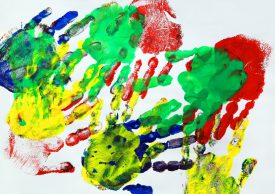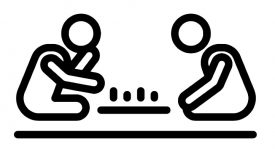What is Child and Adolescent Psychotherapy?
Child and Adolescent Psychotherapy with children and young people is a well-established, highly specialist treatment for emotional and developmental difficulties in childhood and adolescence. It is a particular way of understanding the young person’s mind and functioning in the world around them.
 Although known as a ‘talking therapy’, children and young people will often communicate through play in order to understand themselves better, their relationships and what might be troubling them.
Although known as a ‘talking therapy’, children and young people will often communicate through play in order to understand themselves better, their relationships and what might be troubling them.
Together with the child, the Psychotherapist will explore emotions that maybe more under the surface and together increase their understanding of relationship issues. The therapist accompanies the child through their distress.
The aim is to create a reliable, respectful and consistent therapeutic relationship that encourages improved mental health, psychological well-being and a reduction in concerning symptoms.
(Link to ACP website: leaflet for parents and carers)
Who do Child and Adolescent Psychotherapists work with?
In Rotherham CAMHS, Child and Adolescent Psychotherapists work with children and young people from the age of 5 to 18 years old. They also apply their framework of thinking to work with parents, families and carers. They offer consultation to other professionals who work with children, young people and families to encourage a deeper understanding of the child’s emotional development.
They have considerable experience of treating:
- Depression
- Anxiety
- Complex emotional and behavioural difficulties
- Eating and relationship problems
- Self harm
- A range of trauma and attachment difficulties
- Developmental issues
- Children and young people with a combination of the above
Child Psychotherapists also lead the specialist Child Sexual Exploitation consultation pathway in Rotherham, where we support the professional network around children who have been affected by CSE.
Click here for more information about the Child Psychotherapy CSE pathway
How we work
Each child or young person is seen and understood within the context of their family and their wider environment and careful thought is given to the need for support for parents or carers and other family members.
A Child Psychotherapist will help the child or young person to make sense of their personal experiences and feelings which can help them progress through their own individual developmental journey. They work with children whose difficulties maybe longstanding and severe and they are able to build and sustain a relationship with the child or young person over a longer treatment time. It is hoped that by being understood and through developing a thoughtful relationship with their therapist, they will find new and healthier ways of managing their difficulties.
Internal world assessment
Is an in-depth assessment providing a detailed description and perspective on a child or young person’s emotional world.
There are times when an assessment with a detailed review and feedback meeting may be enough intervention in itself for a child or young person and their family. At other times a more longstanding treatment maybe recommended following an assessment.
Who we work with
In addition to intensive individual work with children, adolescents and their families, Child Psychotherapists work as specialists within the CAMHS multi-disciplinary team. They are skilled at supporting large and complex networks, bringing together professionals through consultation, training, and therapeutic thinking. For example, they offer consultation to CAMHS practitioners, community and front-line services, such as Early Help, school/college counsellors and those in the voluntary sector.
In Rotherham, Child and Adolescent Psychotherapists contribute to the delivery of a specialist Trauma and Resilience Service The Trauma and Resilience Service Rotherham which works to promote and develop Trauma Informed practice and awareness across the locality. The TRS work both systemically and holistically with both the local voluntary and statutory workforce supporting their intervention with adult CSE survivors and their families.